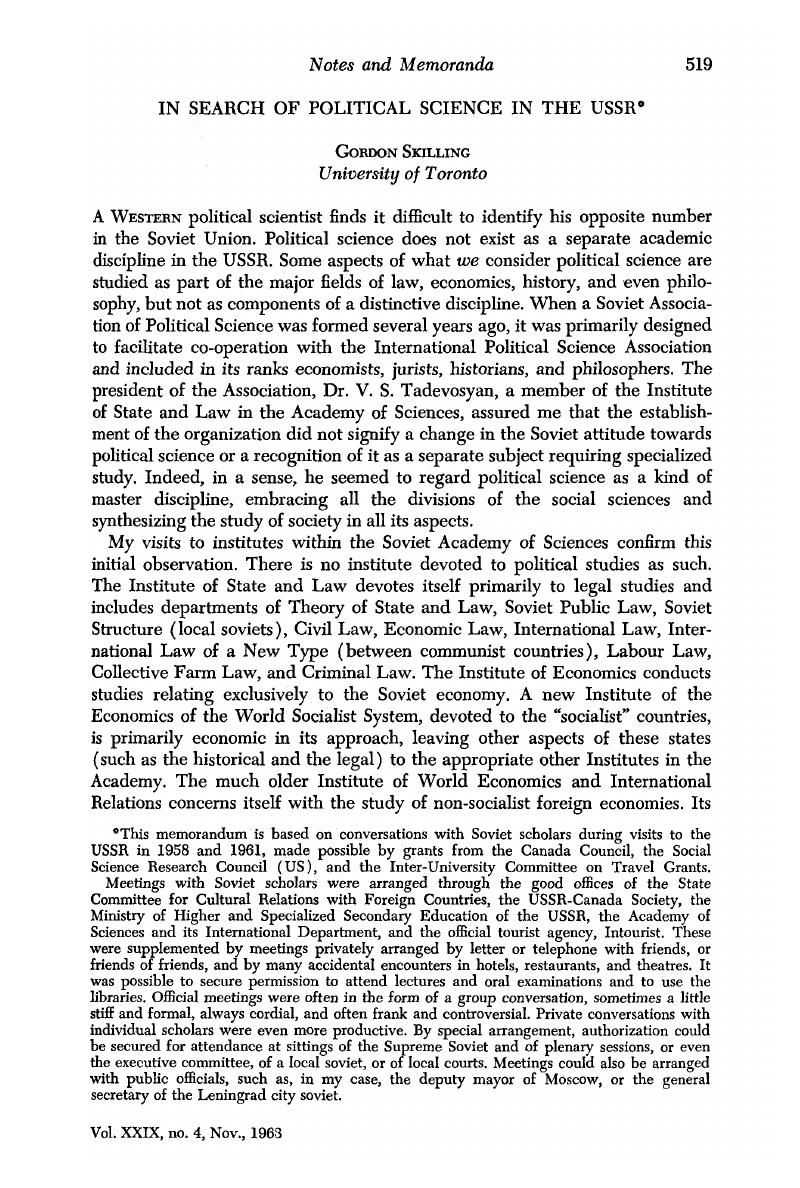Published online by Cambridge University Press: 07 November 2014

This memorandum is based on conversations with Soviet scholars during visits to the USSR in 1958 and 1961, made possible by grants from the Canada Council, the Social Science Research Council (US), and the Inter-University Committee on Travel Grants.
Meetings with Soviet scholars were arranged through the good offices of the State Committee for Cultural Relations with Foreign Countries, the USSR-Canada Society, the Ministry of Higher and Specialized Secondary Education of the USSR, the Academy of Sciences and its International Department, and the official tourist agency, Intourist. These were supplemented by meetings privately arranged by letter or telephone with friends, or friends of friends, and by many accidental encounters in hotels, restaurants, and theatres. It was possible to secure permission to attend lectures and oral examinations and to use the libraries. Official meetings were often in the form of a group conversation, sometimes a little stiff and formal, always cordial, and often frank and controversial. Private conversations with individual scholars were even more productive. By special arrangement, authorization could be secured for attendance at sittings of the Supreme Soviet and of plenary sessions, or even the executive committee, of a local soviet, or of local courts. Meetings could also be arranged with public officials, such as, in my case, the deputy mayor of Moscow, or the general secretary of the Leningrad city soviet.
1 At Moscow, there are seven chairs: 1, Political Economy; 2, Statistics; 3, Economic Industrialization and Planning; 4, Agricultural Economics and Planning; 5, Accounting and the Analysis of the Activity of Enterprises; 6, History of the National Economy and of Economic Sciences; and 7, The Economies of Foreign Countries.
2 The courses include Political Economy, Dialectical and Historical Materialism, Party History, Foreign Languages, History of Economic Thought, History of the National Economy of the Soviet Union, History of the National Economy of Foreign Countries, Planning of the National Economy, Economics of Industry, Economics of Agriculture, Economics of Trade, Finance and Credit, Technology of Industry and Agriculture, Mathematics, Mathematical Economics, Statistics, Economic Statistics, Economic Activity of Enterprises, Accounting, History of International Relations, Problems of Law, and International Law.
3 The Uchebny plan (instruction plan) requires the following courses, with the number of hours taken during the five-year period given in brackets: 1, History of the CPSU (Communist Party of the Soviet Union) (220); 2, Political economy (300); 3, Dialectical and historical materialism (140); 4, Logic (54); 5, Foreign Languages (270); 6, Latin (100); 7, Theory of State and Law (130); 8, History of State and Law (130); 9, History of State and Law, USSR (130); 10, History of State and Law, the Union Republics (48); 11, History of Political Theories (92); 12, Roman Civil Law (32); 13, Soviet Constitutional Law (108); 14, The Court and the Procuracy (54); 15, Constitutional Law of the People's Democracies (48); 16, Constitutional Law of Bourgeois Countries (70); 17, Soviet Administrative Law (100); 18, Soviet Financial Law (54); 19, Soviet Criminal Law (210); 20, Soviet Criminal Law Procedure (132); 21, Criminology (156); 22, Soviet Civil Law (228); 23, Soviet Family Law (30); 24, Soviet Civil Procedure (132); 25, Soviet Labour Law (132); 26, Soviet Agricultural Law (54); 27, Collective Farm Law (96); 28, International Law (92); 29, Soviet Judicial Statistics (48); 30, Bases of Book-keeping and Accounting, etc. (56); 31, Court Medicine (48); 32, Court psychology (48); 33, Procuratorial supervision (56); 34, Special courses and seminars, general theory of state and law (64); 35, Special courses and seminars–options (340); and 36, Physical training (136).
4 In a conversation with G. D. Obichkin, deputy director of the Institute, the discussion of Trotsky indicated that there was no change in the attitude towards “Trotskyism” as a view hostile to Leninism. My own suggestion that Lenin's theory of uninterrupted revolution was not unlike Trotsky's doctrine of permanent revolution was countered at length, with many citations from Lenin to prove the point.
5 I was invited to give a lecture, and did so, in the Chair of Foreign Economic Systems, in the Faculty of Economics, at the University of Moscow. My topic was “The Study of the Soviet Union in the United States and Canada.” The lecture was announced by a large poster in the halls of the University and was attended by about fifty persons.
6 The ruble may be taken as roughly equivalent to $1.20 Canadian.
7 The doctor's degree is commonly not taken until later in life, and is based on a thesis defended publicly before the council of the faculty. I attended the defence of a thesis on city planning presented to the Faculty of Geography. It was attended by about a hundred persons, and lasted three to four hours. The candidate was a middle-aged professor who had already published many books and was a specialist in his field. His thesis, and his oral performance, were impressive. Secret ballot of the council members gave a favourable decision, with a minority of one opposed.
8 One who is preparing to fulfil the requirements of “candidacy,” which is roughly equivalent to a master's degree.
9 These hours have been substantially reduced since this article was written.